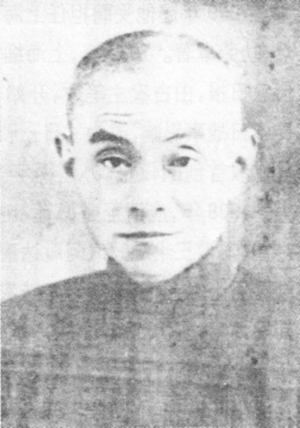Views
Fàn Gǔnóng 范古農 (1881-1951)
|
| Notable Associates: |
|
Fàn Gǔnóng 范古農 (1881-1951) was a highly influential editor of Buddhist books and periodicals in the Republic. He was also involved in lecturing and the lay study of Consciousness-Only 唯識 thought.
Contents |
Biography
Fàn was from Jiāxīng 嘉興 in Zhèjiāng 浙江. Growing up, he received a traditional education at a private academy 塾. At 18 he went to study at the Nányáng Public School 南洋公學 in Shànghǎi 上海. When he graduated, he went to work in Hángzhōu 杭州 at a classical academy. There he learned about Buddhism from the father of his classmate, Jiǎng Bǎiqì 蔣百器, who worked at a newspaper in Tiānjīn 天津. Fàn became interested in Buddhism after reading a copy of A Direct Explanation of the Sūtra of Perfect Enlightenment 圓覺經直解 (X 10.258) by the Ming Dynasty monk Hānshān Déqīng 憨山德清, which he had picked up a bookstore. Fàn married Qī Liángjǐn 戚良瑾 at age 20. Around this time he started a girls’ school.
At 27, Fàn went to Japan and studied at a physics training school in Tokyo. While in Japan, he met Zhāng Tàiyán 章太炎. He also studied the Laṅkāvatāra Sūtra 楞伽經 and Consciousness-Only thought.
Fàn returned to China at 29 and set up a middle school. He heard a lecture by Huáshān 華山 on the Amitabha Sūtra and began having faith in Buddhism. He began his study of Buddhism using Yáng Wénhuì’s 楊文會 A Buddhist Primer 佛教初學課本.
At the start of the Republic, Fàn set up a Buddhist school at Jīngyán Temple 精嚴寺 in Jiāxīng. This school had a reading room and a copy of the Buddhist canon. Fàn took on teaching duties himself. During summer and winter breaks he went on lecture tours around Zhèjiāng. In 1914 he is listed as a founding member of the Buddhist Studies Research Association 佛學研究會, established in Jiāhé county 嘉禾縣 Húnán 湖南 and Pínghú 平湖 in Jiāxīng 嘉興, Zhèjiāng 浙江.[1]
In 1917, he took refuge under Dìxián 諦閑, from whom he learned about Tiāntái 天台. Fàn was not partisan, however, and also respected Tàixū 太虛, Yuányīng 圓瑛, and Yìnguāng 印光. He eventually focused his study of Buddhism on the Chéng wéishì lùn 成唯識論 and the Yogācāra-bhūmi-śāstra 瑜伽師地論. In September of 1918, Fàn invited the recently-ordained Hóngyì 弘一 to study at his school, which the latter did for several months.
In January 1929, Fàn he was invited to Shànghǎi to serve as general editor for the nascent Shànghǎi Buddhist Books 上海佛學書局. He had numerous duties while there, including editing Buddhism Semimonthly 佛學半月刊, which began publication in 1930. For the Semimonthly he contributed a regular Q&A column. In April, 1935 he became general editor of the first daily Buddhist newspaper in China.
Because of the War, in August, 1937, he fled to Chányuán Temple 禪源寺 on Mt. Tiānmù 天目山. The following year he accepted an invitation to lecture on Pure Land, Consciousness-Only, and Abhidharma at the Shěngxīn Lotus Society 省心蓮社 in Shànghǎi.
After the end of the War, he returned to Jiāxīng, but continued, despite his age, lecturing in surrounding areas. In 1948 he went back to Shànghǎi and became the sixth head of the Shànghǎi Lay Buddhist Association 上海佛教居士林, and also formed a Consciousness-Only study group.
On March 21, 1951, he finished a lecture and the next day became ill. He passed away in hospital on April 12.
Important Works
- 八識規矩頌貫珠解
- 大乘空義集要
- 法相學課本
- 觀所緣緣論貫珠釋
- 幻庵文集
- 釋尊傳
- 往生論注擷
- Gǔnóng Fóxué dāwèn 古農佛學答問 (Fan Gunong Answers Questions on Buddhist Studies). 7 fascicles 卷. Shanghai: Shanghai foxue shuju 上海佛學書局, 1935
Notes
- ↑ MFQ 4:102
References
- Fāng Zǔyóu 方祖猷. Tiāntái zōng guānzōng jiǎngsì zhì: 1912-1949 天台宗觀宗講寺志: 1912-1949 (Gazetteer for the Guānzōng Lecture Temple of the Tiāntái School, 1912-1949.) Běijīng: Zōngjiào wénhuà chūbǎnshè, 2006. Pp. 125-129.
- Shì Dōngchū 釋東初. Zhōngguó Fójiào jìndài shǐ 中國佛教近代史 (A History of Early Contemporary Chinese Buddhism), in Dōngchū lǎorén quánjí 東初老人全集 (Complete Collection of Old Man Dongchu), vols. 1-2. Taipei: Dongchu, 1974 Pp. 2.707-712.
- Yú Língbō 于凌波. Zhōngguó jìnxiàndài fójiào rénwù zhì 中國近現代佛教人物志. Běijīng 北京: Zōngjiào wénhuà chūbǎnshè 宗教文化出版社, 1995. Pp. 491-499.
- Yú Língbō 于凌波, ed. Xiàndài Fójiào rénwù cídiǎn 現代佛教人物辭典 (A Dictionary of Modern Buddhist Persons), 2 vols. Taipei: Foguang, 2004. Pp. 1.786c-789c.
